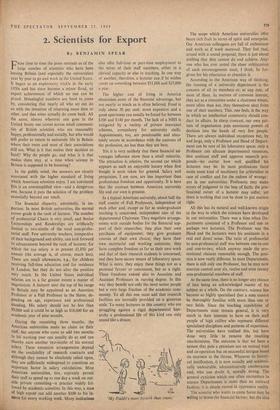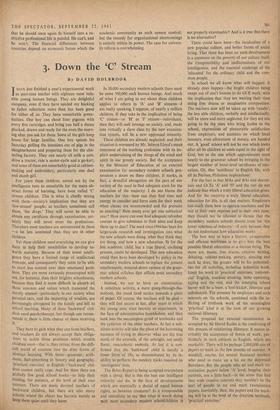2. Scientists for Export By BENJAMIN SPEAR F ROM time to
time the press reminds us of the large number of scientists who have been leaving Britain (and especially the universities) year by year to go and work in the United States. It began as an exploratory trickle in the early 1950s and has since become a minor flood, an export achievement of which no one can be proud. Meaningful numbers are hard to come by, considering that nearly all who set out do so with the intention of returning some time or other, and that some actually do come back. All the same, almost wherever one goes in the United States one comes across small communi- ties of British scientists who are reasonably happy, professionally and socially, but who would still prefer to return to university life in Britain where their roots and most of their associations still are. What is it that makes their decision so hard? Why do people go, and what is it that makes them stay, at a time when science in Britain is supposed to be booming?
In the public mind, the answers are closely associated with the higher standard of living which American scientists enjoy. I am convinced this is an oversimplified view—and a dangerous one, because it puts the solution of the problem essentially beyond our reach.
The financial disparity, admittedly, is im- portant. In most British universities, the normal career grade is the rank of lecturer. The number of professorial Chairs is very small, and Senior Lectureships and Readerships are artificially limited to two-ninths of the total non-profes- sorial staff. Few university teachers, irrespective of their background and ability, can look forward to advancement beyond the rank of lecturer, for which, the top salary is at present £1,850 per annum (the average is, of course, much less). There are small allowances, e.g., for children receiving full-time education and for residence to London, but they do not alter the position very much. In the United States individual salaries are to a far greater extent a matter of negotiation. A lecturer near the top of his range in Britain may be appointed as an Associate Professor or a Full Professor in the States, de- pending on age, experience and professional standing. His salary should not be less than $9,000 and it could be as high as $18,000 for an academic year of nine months.
During the remaining three months, the American universities make no claim on their staff, but anyone who cares to add two months to his working year can usually do so and can thereby earn another two-ninths of his normal salary. These extension arrangements depend on the availability of research contracts and although they cannot be absolutely relied upon, they are sufficiently widespread to constitute an Important factor in salary calculations. Most American universities, too, . expressly permit their staff to spend up to one day a week on out- side private consulting—a practice widely fol- lowed by academic scientists. In this way, a man of high repute can add another $100 to his in- come for every working week. Many institutions also offer full-time or part-time employment to the wives of their staff members, either in a clerical capacity or else in teaching. In one way or another, therefore, a lecturer can,if he wishes count on something between $11,000 and $25,000 a year.
The higher cost of living in America diminishes some of the financial advantage, but not nearly as much as is often believed. Food is only about 30 per cent. more expensive and a good apartment can usually be found for between $100 and $140 per month. The lack of a NHS is mitigated by a variety of private insurance schemes, compulsory for university staffs. Appointments, too, are pensionable and abso- lutely secure in accordance with the customs of the profession, no less than they are here.
Yet it is very unlikely that these financial ad- vantages influence more than a small minority. The attraction is relative, the second car which appears as such an enjoyable luxury when first bought is soon taken for granted. Salary and perquisites, I am sure, are less important than professional freedom and opportunity. It is here that the contrast between American university life and our own is greatest.
In a typical American university, about half the staff consist of Full Professors, independent of each other and, except as far as undergraduate teaching is concerned, independent also of the departmental Chairman. They negotiate arrange- ments with outside bodies for the financial sup- port of their researches; they plan their own purchases of equipment; they give graduate courses of their own choice; they have their own secretarial and working assistants; they have complete freedom as far as their own work and that of their research students is concerned; and they have secure tenure of laboratory space. What is more, they enjoy these things not as a personal favour or concession, but as a right. These freedoms extend also to Associate and Assistant Professors in varying degree. In this way they benefit not only the most senior people but a very large fraction of the academic com- munity. To all this one must add that research facilities are normally provided on a generous scale. To many lecturers in this country who are struggling against a rigid departmental hier- archy a professional life of this kind can only sound like a dream.
`My Daddy's more berserk than yours.' The scope which American universities offer bears rich fruit in terms of spirit and enterprise.
Our American colleagues are full of enthusiasm and work as if work mattered. They feel that, armed with a sound proposal, there is just about nothing that they cannot do and achieve. Any- one who has ever tasted the sheer exhilaration of such encouragement must, I think, be for- given for his reluctance to abandon it.
According to the American way of thinking, the running of a university department is the concern of all its members or, at any rate, of most of them. In matters of common interest, they act as a committee under a chairman whom, more often than not, they themselves elect from one of their numbers. This, one feels, is the way in which an intellectual community should con- duct its affairs. In sharp contrast, our own pat- tern of organisation puts enormous powers of decision into the hands of very few people.
There are always individual exceptions but, by and large, only a Professor and Head of Depart- ment can be sure of his laboratory space; only a Professor can allocate departmental resources, hire assistant staff and approve research pro- posals—no matter how well qualified his lecturers may be. In most professions there exists some kind of machinery for arbitration in case of conflict and for the redress of wrongs; not in our universities. Professors may make errors of judgment in the best of faith; the pro- fessional career of a lecturer may suffer, yet there is nothing that can be done to put matters right.
All this has its natural and well-known origin in the way in which the sciences have developed in our universities. There was a time when De- partments consisted of a Professor and one or perhaps two lecturers. The Professor was the Head and the lecturers were his assistants in a real and direct sense. The ratio of professorial to non-professorial staff was between one-to-one and one-to-two, which anyway made the pro- motional chances reasonable enough. The posi- tion is now vastly different. In most Departments, there is still only one Professor, but he may now exercise control over six, twelve and even twenty non-professorial members of staff.
At the same time, there is no longer any chance of him being an acknowledged master of his subject as a whole. On the contrary, science has become so highly specialised that a man cannot be thoroughly familiar with more than one or two fields. Since the teaching capabilities of Departments must remain general, it is very much in their interests to have on their staff people of high calibre who represent different specialised disciplines and patterns of experience. The universities have realised this, but have done very little to remove the resulting anachronisms. The outcome is that we have a system that puts a premium not on mutual trust and co-operation but on successful intrigue based on nearness to the throne. Whatever its histori- cal justification, it is now socially and academi- cally undesirable, administratively cumbersome and, who can doubt it, morally wrong. The general cynicism which one often encounters in science Departments is more than an outward fashion; it is deeply rooted in oppressive reality. The scientist who wants to come home may be willing to brave the financial barrier; but the idea that he should once again fit himself into a re- strictive professional life is painful. He can't, and he won't. The financial differences between countries depend on economic forces which the academic community as such cannot control; but the remedy for organisational shortcomings i3 entirely within its power. The case for univers- ity reform is overwhelming.











































 Previous page
Previous page